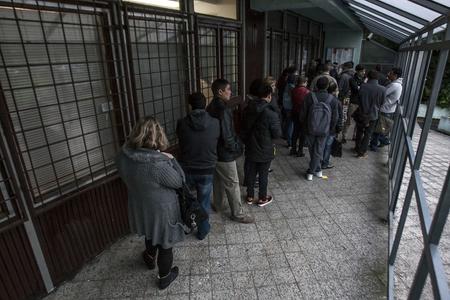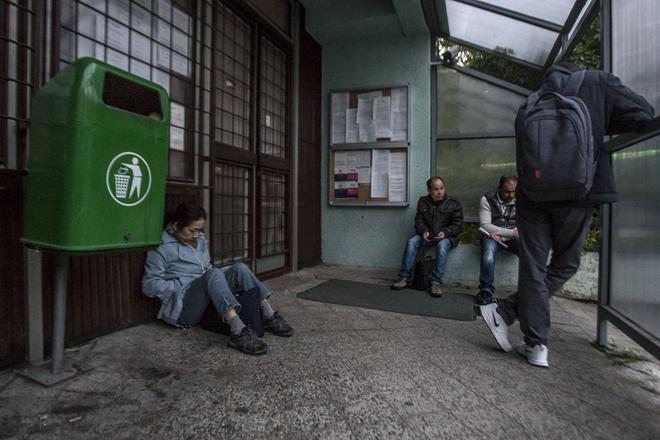While most people camp in the mountains and at festivals during the summer, foreigners living in Bratislava sleep under the open skies to make sure the foreigners’ police department handles their document requests.
Some of the people in the queue have thus come up with unofficial queuing lists on scrap papers that are regularly checked, a Mexican citizen living in Slovakia, who did not wish to have his name published, wrote in a post on Facebook.
He describes his experience of learning about the unofficial lists of people waiting to visit the foreigners’ police in Bratislava. He arrived at the department on a Monday at 4 a.m. to handle his visa. Although he had been issued a queuing ticket, someone pulled him out of the queue and told him to add his name to a list. The available times on the list stretched over the next two days: even on Monday morning, he could only enter his name for Wednesday.
Foreigners on Facebook say that the list is checked every three to four hours. People come to call out the names of those who are next on the list, and if the foreigner is not present during the check, his or her name is taken off the list.
“So they say I have to be here every time that they come to check on the list until Wednesday,” the foreigner wrote on Facebook. “I really do not know what to do, and I am frustrated.”
The police claim that the unofficial list cannot influence the work of the department in Petržalka.
“The Alien Police strictly follows the queuing system at the department, regardless of the lists mentioned,” the Police Corps Presidium wrote in a statement.
Visa with Ukraine
The management of the foreigners’ police confirmed off the record that they have noticed problems with longer queues. They believe this might be a result of the introduction of the visa-free regime for Ukraine in April of this year, which moved some of the administrative work surrounding residence in Slovakia from the Embassy in Kyiv to the foreigners’ police.
This explanation however does not hold, says Zuzana Števulová of the Human Rights League. The NGO, which works with refugees in Slovakia, has noted days-long queues in front of the Bratislava department as early as the beginning of this year.
“We do not know the reasons, but our experience is that a client who went there in the spring to prolong an asylum status had to sleep in front of the building,” Števulová said.
Foreigners on Facebook confirm statements like this, and many say it has long been an issue at the department.
An enduring problem
The staff of the department have not been aware of a recent list of queuing people, the management of the foreigners’ police said.
The Slovak Spectator wrote about the problem in February when, following a report by the public-service television RTVS, a note appeared on the door of the department warning people against using the unofficial lists.

People have been trying to handle the long queues in various unofficial ways for years. When the Sme daily wrote about the queues in 2014, some foreigners admitted that they would hire people to queue on their behalf, for a reward of 30-80 euros. A police officer had once been posted to overlook the queue and prevent attempts to sell the queuing tickets.
“This is a result of the bad management of the police,” Števulová said. “Everybody knows this is how it works there.”
Change promised, again
In September 2014, Interior Minister Robert Kaliňák (Smer) promised to solve the problem by moving the department to a larger building.
“If they begin queuing at midnight to get an appointment at eight, then it almost resembles waiting for an iPhone,” the minister had joked.
Three years later, in June 2017, Bureau of Border and Alien Police director Ladislav Csémi again promised that the Bratislava department would move. The proposed destination is the former military premises in Vajnory, where officials say the police should move by the middle of next year.
Csémi also promises improvements for the officers’ working conditions. As of now, there are few officers compared to the number of foreigners in Bratislava, according to Števulová, and her organisation has also noted a high turnover rate of the staff. This means that there are often new staff members in training.
“Another problem is that all of the requests have to be filed in person, rather than electronically,” Števulová said.



 Foreigners queuing in Petržalka. (source: Sme)
Foreigners queuing in Petržalka. (source: Sme)